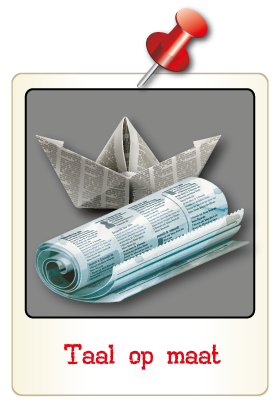What do you need? What’s your question? How do you learn most easily? What do you find the most interesting? Language is a means of communication and a means to express yourself. Everyone has different questions and different interests and needs. The challenge for me is to arrange what you need. Language for you that is, in the way that works best for you.
Examples
Arts and crafts in a day care center
A child daycare center in Maarssen was looking for Dutch classes for its non-Dutch speaking members of staff. Together with these women, I have done arts and crafts and we went cooked meals together. This way, I could teach them all kinds of different nuances necessary for such activities (rip, tear, tear apart, fold, fold back, fold in half, fold in the middle, fold in quarters, mix, stir, whip, blend, etc). We have practiced conversing with parents through role plays. Moreover we took inventory of all different types of swearing words and we divided them into categories so the women could – based on this overview – address the children accordingly.
Learning grammar using your hobby
An advanced Dutch-as-second-language speaker wanted to improve his Dutch. His big passion is sports, specifically cycle racing. Based on several soccer- and cycle reports and movies, we have zoomed in on grammatical structures used to describe these sports and we practiced with them. Having the Tour de France start in Utrecht in 2015 was a very unique coincidence!
Improving your grammar
An employee of a bank wanted to improve primarily his grammatical knowledge and –skills. He possessed a decent amount of Dutch vocabulary and had many Dutch friends. However, he had never had lessons in the use of Dutch grammar. In just five lessons we’ve gone over several difficult grammar topics.
Improving Dutch spelling
A (Dutch) entrepreneur with his own company in bicycles was looking for support with his spelling for the texts he was writing for his websites and for writing a final assignment for a course he was following. Together, we’ve rehearsed Dutch verb spelling and we practiced a lot. Moreover, we discussed the texts he wrote and we re-wrote them.
The literature club
Together with a group of advance Dutch as a second language students we get together about once per month. Prior to the meeting, we all read a Dutch book. That can either be a “boekenweekgeschenk” (book you get for free during “the week of the books”) or any regular book. Two of the participants prepare a short prestation about the writer and about literary aspects of the book. This way we learn more Dutch, we have a nice introduction into Dutch literature and we practice our conversation skills (and we have a very nice glass of wine on special evenings). Want to join? You can if there is space available. Participation only on invitation.
Conversation group
Based on several Dutch themes, two participants prepare a presentation. The other participants and I will assess the presentation. We will record it and discuss it together. Further, we will converse in more detail according to this theme. Examples: the Dutch public television network, general practitioners, doctors and the medical system, temporary employment agencies, school systems, feministic history, political parties, water works. Want to join? You can if there is space available. Participation only on invitation.
